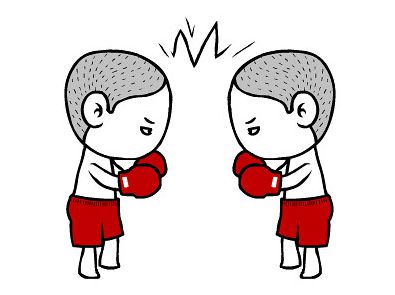
What’s the first thing you think of when you feel messed up in your life? If you’re like most people, it’s, “I gotta get rid of this issue.” But the conventional wisdom on how to deal with problems—meaning whatever disturbs you in your life—is all wrong. It’s based on a false assumption about why ‘shit happens.’ It assumes your problems are personal ordeals with no purpose other than to make you miserable. The roots of this way of thinking come from the age-old belief that pleasure and freedom from stress are good, and difficulties are bad or evil. It’s an instinctive, unconscious way of interpreting experience, and most people still live with this mindset.
Science and technology have improved our lives by applying the scientific method to the idea that problems are purely negative and should just be eliminated. Yet in the fields of psychiatry, psychology, and self-help, this demonization of problems makes us impotent to really understand and transform them. It misses what they actually are: Unrecognized personal growth and change trying to happen.
A problem is a meaningful and purposeful process designed specifically to make you develop as a person. This isn’t something arbitrary where you get to decide which of your troubles relate to personal growth and which don’t. Everything you struggle with is meant to force the evolution of your consciousness, expand your identity, and increase your self-awareness. Each issue you encounter aims at a specific change you need to make, a transformation of your awareness in a highly targeted area of your life. The details of your difficulty contain information that’s trying to point you toward a new way of being.
A problem has a goal, and despite the fact that pain sucks, suffering isn’t its goal at all. Pain and suffering are alarm signals calling you to yourself, bringing your attention to the hidden directions trying to happen in your life. Just wanting to get rid of what bothers you without getting its message, is understandable; nobody likes to suffer. But it’s an attitude rooted in a simplistic understanding of life—and it’s ineffective.
You might be thinking, “Isn’t this backwards? You have a problem, and you want to get rid of it, right?” Like I said, no one wants to suffer. We all just want these painful problems to go away. And we want to get rid of them in whatever way we can: Ignoring, rationalizing, or medicating them, trying to change our thoughts or use will power, detaching, meditating, or even just hoping and praying they’ll disappear. But too often they don’t go away. Or they leave and then come back over and over again as we battle to manage them. So, yes, what I’m saying is totally and completely backwards—on purpose! Because the way most of us deal with trouble is upside down, inside out, and all confused. A problem is actually an unseen process of positive change trying to come forward. Problems contain gold! You just don’t see it while they’re happening. Decoding and processing them not only heals but transforms your life too.
Bad states of mind make you feel like hell—depressed, anxious, lonely, hopeless, frustrated, self-critical, obsessive…. All bad stuff you don’t want, right? So there’s no debate that these states of mind are bad. The mistaken notion is that they’re states! A state of mind is fixed and static. It doesn’t go anywhere. It doesn’t move or evolve. If it’s negative, like depression, anxiety, or pain, it’s a problem sitting there making you unhappy, and you wish it would go away. You say, ‘I’m depressed,’ as if ‘depressed’ is this immovable force that just takes over and has no purpose or larger context associated with it. You don’t view it as having any potential to go anywhere, to unfold, to transform into anything meaningful. You see it simply as a painful, negative state of mind. You think of it as a meaningless mood that has power over you, not as an important process you’re in. Maybe you even get a psychiatric diagnosis. Then you can say, ‘I was diagnosed with depression,’ as if the depression is some kind of ‘thing’ in you. You can even create a permanent identity out of it.
This is all part of the commonly accepted idea that trouble in your life is something purely negative that needs be eliminated right away. It can’t possibly lead to something positive, so we need to find a way to get rid of it pronto—instant gratification, the quickest fix possible. The logical response of a healthcare practitioner is to try to change your bad state of mind into a good one. Most doctors, psychiatrists, psychologists, and even spiritual teachers have a very specific idea of what this good state of mind is—and it’s thought of as the solution to your problems. I call these desired states of mind, preferred states. We’re all chasing after them. We spend our days hoping to get into one of these desired frames of mind.
For example, a psychiatrist’s preferred state for his patients is simply to be symptom-free. He might say, ‘You’re depressed? Here, take this pill, and it will get rid of the bad feeling.’ For a psychologist using a popular method called cognitive behavioral therapy, the preferred state is to be able to be objective about your thoughts, think rationally, and stay disentangled from negative thinking. She may say something like, ‘Identify the irrational, negative thoughts that make you feel depressed, and counter them with rational, positive thoughts and energy.’ An alternative to this is called dialectical behavioral therapy, which helps you be more objective about your emotions in relationships. A therapist using this technique may teach you cheerleading-type statements to say to yourself, like, ‘I can still feel good about myself even though someone else is annoyed with me,’ or ‘I can stand it if I don’t get what I want or need.’”
For a motivational guru, the preferred state is one of abundant, positive energy combined with decisive action. He might show you how to tap into your personal power so you can take charge of a situation that’s weighing you down and go for your goals. For a spiritual teacher, the preferred state of mind is blissful, loving, and peaceful. She may share ancient wisdom with you and teach you techniques for calming your mind and gaining insight about yourself. Lots of folks practice yoga or meditation which helps them get into a relaxed, centered, state of mind. Other people use positive self-talk that helps them deal with negative thoughts and feelings. I know some folks who go for extreme fitness, and a few who joined the military to learn physical and mental toughness as a way to deal with what life throws at them. So, there are lots of different preferred states of mind people strive after.
Each preferred state is a different way of being—tough and hard, calm and blissful, revved up and determined, compassionate and caring, rational and objective, etc.. They’re ideals of how to be, and the idea is that if you can be this way, you’ll be able to get around your problems—or at least they won’t bother you so much.
Maybe, now you’re thinking, “But what’s wrong with all that? Aren’t they just different ways to deal with what’s bugging you?”
Yes, totally. They all aim at a state change by helping you get into a different frame of mind. This can give you temporary relief and help you deal with things better. But that’s totally different from actually processing and transforming a problem. You see, the specific method isn’t important; it’s the context it’s used in that matters. The same methods used in psychology to help folks are used in advertising to brainwash people. The aim, not the method, is what we need to focus on.
My aim isn’t to get you into any particular state of mind, it’s to help you transform your problem by discovering its message. Unfortunately, a nice state of mind won’t do this for you. It can help you temporarily override and manage it, but it can’t transform it. In other words, you get distance from what’s bothering you, but you’re still in the dark as to its meaning and purpose, its transformative message for your life. And what’s the meaning and purpose of it? I can’t say. There’s no general meaning or purpose of a certain kind of problem, there’s only your unique process to explore and unfold. But just getting into a great state of mind isn’t going to do that for you. As soon as your preferred state wears off the problem will return.
Whether it’s medication or determination, spiritual beliefs or positive self-talk, people usually use these interventions to get around their problems, not to process them. While all these methods are beneficial, in a sense they’re really just different kinds of “pills.” That’s great and important, but there’s something even more powerful, transformative, and magical you can tap into—something that has the potential to transform your whole life, not just make you feel better in the moment.
What I’m referring to is the fact that with certain tools* you can hack into your problem, discover its purpose and meaning in your life, and use this awareness to transform it from pain and suffering to personal power and liberation. How do I do this? Instead of trying to reduce symptoms, I amplify them! I know, it sounds crazy, but allow me to explain: Amplification is the process of increasing the magnitude of a signal. For example, to see tiny objects we magnify our vision by using a microscope. To see far away objects we use a telescope. If you want to play loud guitar you plug it into an amplifier. Without these amplification techniques certain information doesn’t appear to our senses: We wouldn’t know that cells exist, how old the universe is, or what it feels like to rock a 1957 Gibson Les Paul guitar plugged into a 1967 Marshall 100 watt amp.
Amplifying signals changes them from remote events we don’t perceive into conscious perceptions. To amplify a problem, I increase the symptoms in a safe environment, and explore, study, and unpack their messages. Instead of medicating, suppressing, or bypassing problems, I go directly into them, exaggerate them, and allow them to reveal their meanings. Without amplifying one’s experience of a problem we have no idea what lies hidden within it. Also, this isn’t something you can just figure out by being smart; you have to go through a process.
Your troubles are signposts, guides to realizing vitally important changes you need to make—changes you might not even know need to happen. Hidden within the very issue you want to get rid of is the holy grail of your life in this moment.
So, when you try to zap away your bad state of mind without getting its message you’re throwing away vital information. In the trash lies the treasure. What feels bad and wrong is actually your teacher pressing you to wake up and learn something new. It’s important to know how to get yourself into a positive state of mind, but over time it’s essential to process your your negative states of mind to discover what they’re telling you. Otherwise, you’ll continually bounce back and forth between suffering and relief, or worse yet, you’ll cut off a part of who you are by completely repressing your process. Strange as it sounds, what’s messing up your life is the solution to your life! Your problem is trying to wake you up to become a more conscious human being. But you have to do the work.
*Let’s look at some examples of how I use amplification to help my clients: How Clara Healed Her Severe Mood Swings and How Bob Transformed His Depressed Moods.
Client names have been changed.


